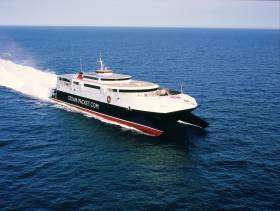Displaying items by tag: Birkenhead route
Manx Steam Packet Fast Ferry Winters In Douglas Harbour But Birkenhead Service Set to Resume
#FerryNews - Isle of Man Steam Packet's final fast-ferry craft seasonal sailing scheduled for this year ended last Sunday, the operator having confirmed the Manannan will again remain in Manx waters this winter.
The Manannan is currently docked in Douglas Harbour where the InCat built catamaran will spend a winter layover into next year. In advance of returning to service, the craft is to undergo routine annual overhaul before resuming on 29th March 2019 on the craft's main route of Douglas-Liverpool. Afloat adds in the high season, the craft also serves Belfast and Dublin.
As Afloat reported today, the Irish Sea's only 'cross-channel' fast-ferry craft, Dublin Swift operated by Irish Ferries is too wintering albeit in Belfast, however the Austal built craft is scheduled to resume seasonal service on the Dublin-Holyhead route next April.
Returning to the IOMSPCo's conventional ropax ferry, Ben-my-Chree, which continues to operate throughout the season, including daily Douglas-Heysham sailings. In addition to starting this weekend services to Birkenhead on Merseyside. Afloat adds the Twelve Quays Terminal facing opposite of Liverpool, is also where Stena Line operate year round to Belfast Harbour.
According to the Manx operator, during Manannan's season this year the craft has the following statistics:
Operated 773 sailings, travelling just under 55,000 nautical miles
Maintained a 100 per cent technical reliability record
Operated at 98.9 per cent reliability – with only four return trips cancelled due to weather
Had main engines accumulate approximately 9,300 running hours
Steam Packet Company Chief Executive Mark Woodward explained: ‘Once again, Manannan has had a great reliability record this season and plays an invaluable role in the Company’s day to day operation.
‘We constantly look for ways to improve services and respond to unforeseen circumstances so the decision to keep her here until after the busy Christmas period will provide an extra degree of support for our vital sea links at an important time of the year.’





























































